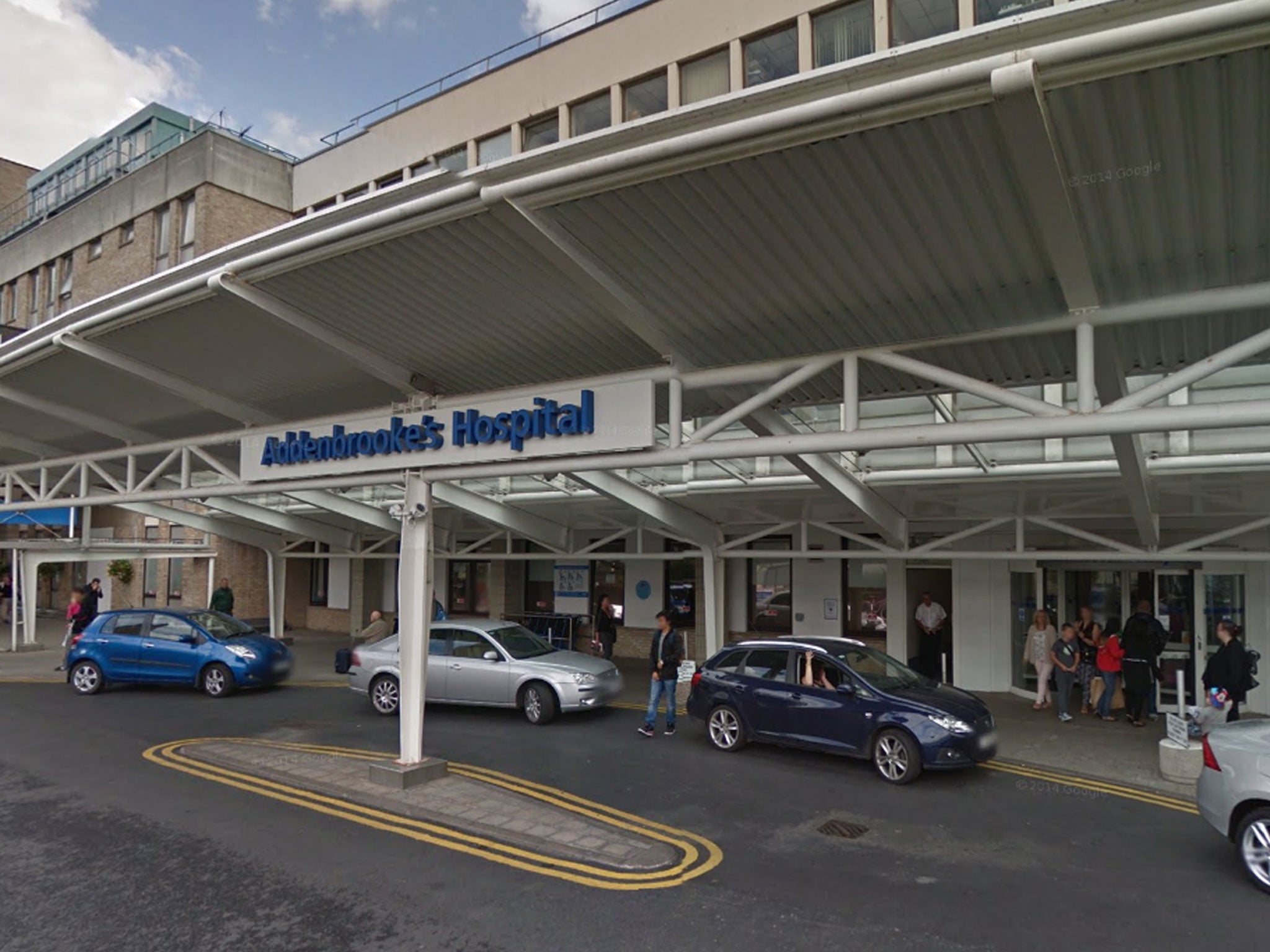Mental health patient kept in an ambulance outside hospital for over 12 hours
Ambulance services and hospitals paying enhanced overtime as pressure on the service grows

A patient experiencing a mental health crisis was kept detained in an ambulance outside an NHS hospital for 12 hours by paramedics and police because of a lack of space anywhere else, The Independent has learned.
Experts and charities say the incident is symptomatic of a wider problem for the NHS and the care of mental health patients because of a lack of adequate safe places for people in crisis.
The unidentified patient was taken by police and paramedics to Addenbrooke’s Hospital earlier this month after being detained under section 136 of the Mental Health Act.
The hospital, run by Cambridge University Hospitals Trust, has been seeing record levels of patients attending its A&E department in recent weeks with some waiting over 20 hours for a bed to be found.
As a result of a lack of space in the department the decision was made to hold the patient outside, where two police officers and paramedics were forced to stay with them for 12 hours.
There is only one section 136 suite for patients in the whole of Cambridgeshire after the local mental health trust closed a second one earlier this year.
Reports of long waits in A&E for mental health patients are common throughout the NHS with some patients wating days to be admitted to a mental health ward.
Andy Bell, deputy chief executive, of the Centre for Mental Health, told The Independent: “Care for people in a mental health emergency has for too long been poorer than the help we get for an urgent physical health need. For someone in a mental health crisis, being kept waiting in an ambulance or police car can be distressing and traumatic.
“Urgent access to specialist care in a safe environment is vital in a mental health emergency. And while the NHS has worked hard to maintain essential services during the pandemic, previous under-investment in mental health care and pressures on the whole system have made it difficult to ensure everyone gets the help they need where and when they need it.”
Meanwhile the Rethink mental illness charity said: “There are worrying signs emerging of stretched services across the country, resulting in delays for people receiving the crisis care they need or being sent miles from home for treatment.”
The pressure on ambulances services in recent weeks has grown with all ten trusts across England now operating at their highest level of pressure.
At the North West Ambulance Service, which has been at its highest level of demand since the start of June, staff have been offered extra pay to work more shifts this weekend amid fears the service will have a shortage of paramedics to meet demand.
In June, NWAS took more than 155,000 emergency calls. That’s 48,000 more than the same period last year and 23,000 more than 2019.
During the past week it had 43,000 999 calls, an average 6,200 a day which was 24 per cent higher than the same period two years ago.
Patients making 999 calls across England are waiting hours for a response with one paramedic in the southwest region telling The Independent they were sent out to an elderly patient who had fallen and waited 11 hours.
Hospitals are also under similar pressure with regular appeals being sent out to doctors and nurses to work extra shifts due to gaps in rotas. Some seen by The Independent also include enhanced pay plus a lieu day off to try and tempt staff to work extra.
A spokesperson for Cambridge University Hospitals Trust said: “Like other hospitals across the country, Addenbrooke’s is currently experiencing very high demand for emergency care. We fully understand how difficult this can be for patients and their families, at what is already a stressful time.
"We can confirm that a patient was brought to Addenbrooke’s emergency department by the police, having been detained under section 136 of the Mental Health Act.
“Due to a lack of appropriate capacity in the emergency department, the decision was taken to care for the patient in an ambulance where they were monitored and safely cared for by ambulance staff and police.”
They added: “Unfortunately CUH was not able to transfer the patient to dedicated mental health services until the following day, as they were also experiencing high demand and a lack of capacity overnight."
Chris Grant, medical director for North West Ambulance Service said: “Our dedicated teams are working hard to answer calls and care for our patients and we are prioritising those that are most sick and severely injured.
“The health and wellbeing of our staff is also extremely important to us, especially given the current pressures; we have measures in place to support them, including trust-supported counselling and links into to other NHS services.
“While we remain very busy, we would urge the public to consider other options if it is not a life-threatening emergency, including NHS 111 online for urgent advice, or your GP or pharmacy.”
Join our commenting forum
Join thought-provoking conversations, follow other Independent readers and see their replies
Comments
Bookmark popover
Removed from bookmarks